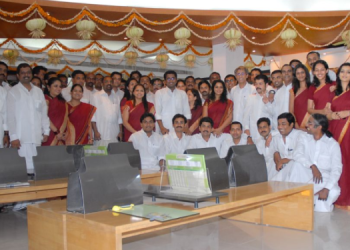Kofluence is an AI-Driven Ad-Tech influencer marketing platform in India, founded by Ritesh Ujjwal and Sreeram Reddy Vanga. The platform looks to create an impact on the Ad-tech industry with the power of its proprietary AI and ML led platform that enables brands and influencers to unlock value from their social influence. With over 650K creators on board and a cumulative reach of 6.5Bn+, Kofluence is at the forefront of influencer marketing technologies.
Kofluence said that it offers a technology-driven connective marketplace where brands and social users can discover and be discovered by one another, handpick who they wish to work with, and at transparent pricing with no hidden charges. Kofluence also offers a Brands App and Creators App that enables easy collaboration and end-to-end campaign management. Kofluence began as a self-funded and bootstrapped venture for its first two years. In early 2022, the platform raised pre-series A funding and gaining backing from marque investors and unicorn founders in the tech world, including Nikhil Kamath (Co-Founder of Zerodha and True Beacon), Kunal Shah (Founder, CRED), Karan Johar (Filmmaker and TV Personality), and Sujeet Kumar (Co-Founder, Udaan).
Medianews4u.com caught up with Ritesh Ujjwal – Co-Founder, Kofluence to find out more.
Q. What is Kofluence’s USP vis-a-vis the competition?
Today, the democratisation of content creation has empowered individuals worldwide to share their creativity with a global audience, thanks in part to the efforts of tech giants like Google and Meta. However, amidst this explosion of content, the influencer marketing domain remains largely disorganised and fragmented. Before our entry into this market, creators often found themselves navigating multiple communication channels and chasing after brands, agencies, and PR partners for timely payments. However, with our self-serve app-based approach, we were able to improve pricing transparency and payment time by 8.5X (from 60 days to 7 Days). Think of Kofluence as the Airbnb for influencers, where content creators have the opportunity to transform their passion into micro-entrepreneurship through content monetization.
Another major challenge has been the absence of robust tools for discovery, pricing, insights, and reporting, making it difficult to run large-scale influencer marketing campaigns efficiently. At Kofluence, we’ve recognised this gap and tackled it by offering a comprehensive platform solution—a two-way marketplace connecting brands and content creators for all influencer marketing needs. By empowering both brands and content creators, we streamline every aspect of the campaign life cycle, from initial creator discovery and matchmaking to comprehensive campaign management, reporting, and secure payments. The goal is to reduce turnaround times and enable quick activations, offering scalable campaign solutions tailored to our clients’ needs.
Q. What trends do you expect to see in influencer marketing in 2024?
As we step into 2024, I believe influencer marketing will continue to undergo significant transformations driven by generative AI advancements. Today, AI tools like Midjourney are revolutionising the creative process for advertisers by swiftly rendering images and generating ideas, surpassing traditional methods in efficiency. Additionally, innovations like Sora from OpenAI are reshaping creativity by generating high-quality content from basic prompts, empowering creators to explore new avenues and push the boundaries of their content.
Decentralisation, transparency, and enhanced data security remain key drivers of innovation. While the true trajectory of Web 3.0 unfolds, these principles keep it dynamic. The year ahead may see AI’s mainstream adoption as a creative tool, a more unified approach to leveraging the metaverse, and improved reliability of blockchain technologies such as NFTs and Web 3.0. Moreover, amid Google’s recent third-party cookie restrictions, influencer marketing emerges as a resilient solution to navigate evolving data privacy regulations. Unlike traditional tracking methods, it thrives on genuine relationships and content, offering marketers a dependable strategy to engage consumers organically while circumventing challenges posed by third-party data limitations.
Q. Inefficiency and trust deficit are issues. Influencer fatigue is growing. How does Kofluence address them?
Indeed, the challenge of inefficiency and a trust deficit in influencer marketing presents significant obstacles for brands striving to optimise their ROI. The proliferation of influencer fraud and mounting concerns regarding influencer fatigue have undoubtedly fueled scepticism among some brand marketers regarding influencer-driven solutions. At Kofluence, we tackle these challenges head-on with a multi-faceted approach.
Firstly, combating influencer fraud is a key. The proprietary risk and fraud detection/prevention mechanism on our platform ensures that marketers get relevant and authentic insights and reporting, and we act as knowledge partners to navigate market trends and success factors with deep category expertise. Instead of relying on personal connections or intuition, our platform utilises data to identify genuine influencers and examine brand and influencer synergy to ensure that businesses are connected with the right influencer. This ensures that brands can confidently invest their marketing budgets while protecting themselves from falling victim to fraudulent activities.
Audiences today are also more discerning and selective in their consumption of content than ever before. With the influx of branded content bombarding their feeds, it’s crucial for brands to navigate influencer fatigue effectively to maintain meaningful engagement. Rather than simply promoting products or services in a transactional manner, we advocate for collaborations that authentically integrate brand messages into influencer content. Moreover, we recognize the power of user-generated content (UGC) in enhancing authenticity and relatability. By incorporating UGC into influencer campaigns, brands can leverage the creativity and authenticity of their own customers and key opinion leaders, further reinforcing the genuine nature of their messaging. In tandem with these efforts, we are committed to ensuring transparency and compliance with regulations in influencer marketing. We advocate for clear disclosures to audiences regarding sponsored content, thereby building trust and credibility with consumers.
Q. Could you give me a few examples of work done with companies like Dominos, Swiggy that stand out?
Our collaborations extend across diverse sectors, reflecting the trust placed in us by an expanding array of brands. Notably, our collaborations with Dominos, KFC, and Swiggy serve as compelling examples of how influencer marketing can effectively boost engagement and brand visibility in competitive markets. We have been collaborating with FMCG industry titans like Wipro, Dabur, and ITC to amplify product launches and seasonal campaigns, leveraging the reach and impact of influencers to connect with shoppers effectively.
We recently collaborated with Netflix for noteworthy launch campaigns, including “Killer Soup”, “The Archies”, and “Kho Gaye hum Kahan”. By aligning our offerings with leading entertainment platforms like Netflix, we’re able to explore new avenues for brand engagement and audience outreach, further enhancing the value we deliver to our clients.
In the consumer durables and automotive sectors, our partnerships with leading brands like Stovekraft, Bajaj, Hero, and Revolt have exemplified the use of creators in brand storytelling and product promotion that drive awareness and consideration for our partners’ offerings.
Q. The startup sector is seeing a slowdown in funding which has impacted their ad spends. Is influencer marketing more cost effective to reach out especially in tier two and three towns and cities?
The recent hurdles faced by India’s prominent unicorns, particularly in the edtech and fintech sectors, have definitely sparked concerns within the media and advertising industry. There’s a growing belief that startups, known for allocating significant resources to TV advertising, especially during marquee sports events like the IPL and cricket world cup, may scale back their ad spends due to financial constraints. Despite the ongoing narrative, I maintain my confidence in the resilience of the Indian startup ecosystem and its appeal to investors. While brands may take a more cautious approach to advertising spending, there’s optimism about continued investment in advertising activities, albeit with a more discerning and strategic focus.
Influencer marketing offers a cost-effective solution for brands seeking to streamline their budgets while maximising returns on advertising spend (ROAS). By collaborating with influencers, brands can tap into targeted audiences aligned with their ideal customer profile without the hefty costs associated with traditional advertising channels. The affordability of influencer partnerships, particularly with micro-influencers, provides an accessible entry point for brands of all sizes. Additionally, influencers’ established credibility and authentic connections with their followers lead to higher engagement rates and increased brand affinity, driving tangible results. With influencer marketing, brands gain the flexibility to execute creative campaigns tailored to their specific goals, while also benefiting from measurable results that enable continuous optimisation for better ROI.
Q. What are some of the misconceptions that exist about influencer marketing?
In the toolkit of brand strategies, influencer marketing undeniably is a top choice among brand marketers today, yet it’s surprising how frequently it’s misunderstood.
Firstly, some believe influencer marketing is solely focused on brand awareness rather than generating leads. While influencers excel at creating engaging content that boosts brand visibility, they can also encourage action and drive conversions through targeted campaigns and strategic messaging. Through our performance marketing campaigns, brands can align influencer collaborations with predetermined key performance indicators (KPIs), including metrics such as clicks, registrations, sales, and more, ensuring measurable outcomes that contribute to overall marketing objectives.
There’s another common misconception that influencer marketing is expensive and time-consuming, suitable only for larger companies with substantial resources. While influencer marketing campaigns can indeed be resource-intensive, they are not exclusively reserved for large corporations. In fact, brands of all sizes can achieve impactful results with influencer partnerships, especially collaborations with micro and nano influencers that offer authenticity and affordability. With standardised pricing and fair markups based on categories, genres, content formats, and social media platforms, we at Kofluence strive to provide equitable and accessible influencer marketing solutions for businesses of all sizes.
Q. How many content creators, influencers do you work with and how effective is your product in matching the content creator with the right brand?
Kofluence houses 650K+ content creators in PAN India with a collective reach of over 6.5 Billion individuals growing every minute.
Our platform employs AI matchmaking, performing numerous integrations to build creator personas based on a variety of parameters such as location, genre,content relevance etc. to identify the most relevant influencers for each brand’s specific needs and objectives, ensuring precise alignment between creators and brands. Along withdeveloping the creator persona, the brand persona is put together and the two are then evaluated to find the best match. Furthermore, with machine learning (ML) acting as the feedback loop, it becomes straightforward to pinpoint areas of concern and ascertain the extent of enhancements required to enhance future campaign performances.
Our extensive database of registered creators enables us to provide brands with access to a diverse pool of talent, ensuring compatibility with various industry verticals and campaign requirements. With our proprietary matching capabilities, brands can confidently partner with content creators who embody their brand values and resonate with their target audience, driving meaningful engagement and achieving campaign success.
Q. The government recently came out with guidelines on celebrity influencers. Your views? Are the guidelines when it comes to influencing in fintech products very important?
Government guidelines on celebrity influencers are pivotal in fostering transparency and integrity within influencer marketing, particularly regarding endorsing fintech products. It’s essential to recognize that these government guidelines not only serve to regulate influencer marketing practices but also underscore the responsibility that influencers hold in shaping public perceptions.
By mandating clear disclosures and accountability measures, these regulations aim to safeguard consumer interests and uphold the integrity of the influencer marketing ecosystem. Particularly in the FinTech influencer marketing segment, stringent guidelines have been introduced to prevent the dissemination of finance-related misinformation on social media platforms, recognizing the potential adverse impact on audiences. To ensure accountability, SEBI has issued guidelines that influencers must adhere to, underscoring the importance of responsible content creation in this domain.
In parallel, while India has made significant strides in developing compliance requirements for influencer advertising, understanding the impact, implementation, and enforcement of ASCI’s Guidelines and CCPA’s directives will require time. Given the relative newness of these guidelines and directives, their effective implementation and enforcement remain to be seen. It is a question of how impactful these regulations and guidelines are and how they will continue to benefit the audiences of social media platforms. To address these challenges, it’s crucial to adopt a culture of due diligence and an inclusive approach that recognises the collective responsibility of brands, influencers, agencies, and others in maintaining ethical standards.
Updated @5:29 PM based on request from Kofluence

















